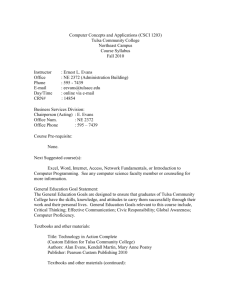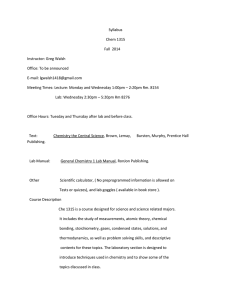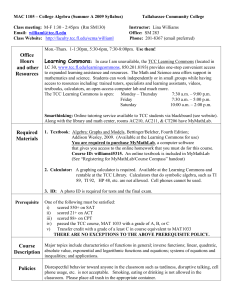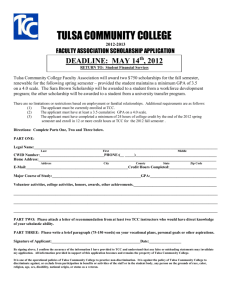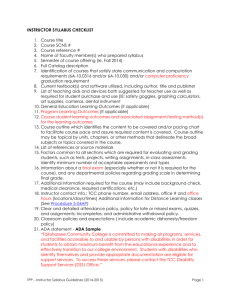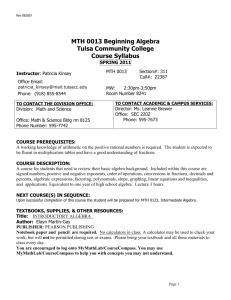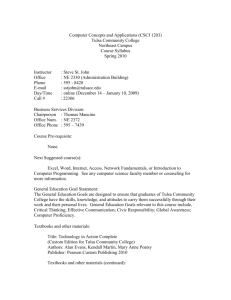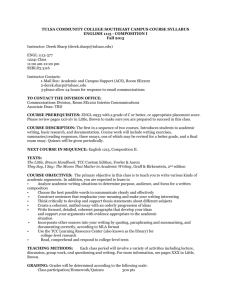new window - Blackboard - Tulsa Community College
advertisement
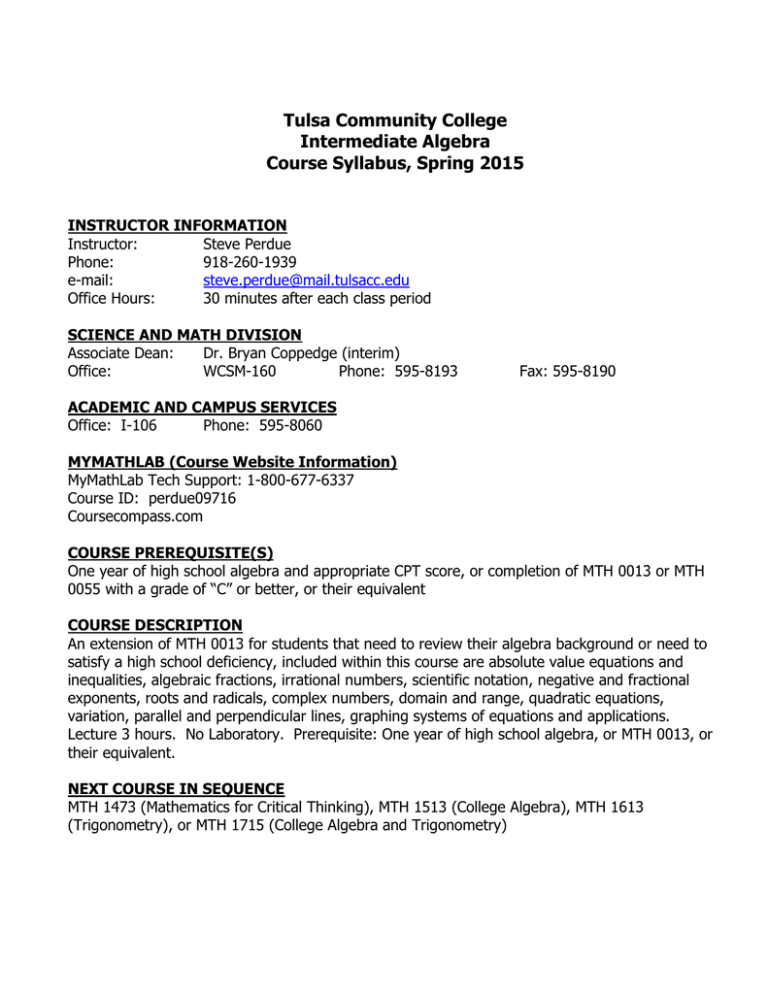
Tulsa Community College Intermediate Algebra Course Syllabus, Spring 2015 INSTRUCTOR INFORMATION Instructor: Steve Perdue Phone: 918-260-1939 e-mail: steve.perdue@mail.tulsacc.edu Office Hours: 30 minutes after each class period SCIENCE AND MATH DIVISION Associate Dean: Dr. Bryan Coppedge (interim) Office: WCSM-160 Phone: 595-8193 Fax: 595-8190 ACADEMIC AND CAMPUS SERVICES Office: I-106 Phone: 595-8060 MYMATHLAB (Course Website Information) MyMathLab Tech Support: 1-800-677-6337 Course ID: perdue09716 Coursecompass.com COURSE PREREQUISITE(S) One year of high school algebra and appropriate CPT score, or completion of MTH 0013 or MTH 0055 with a grade of “C” or better, or their equivalent COURSE DESCRIPTION An extension of MTH 0013 for students that need to review their algebra background or need to satisfy a high school deficiency, included within this course are absolute value equations and inequalities, algebraic fractions, irrational numbers, scientific notation, negative and fractional exponents, roots and radicals, complex numbers, domain and range, quadratic equations, variation, parallel and perpendicular lines, graphing systems of equations and applications. Lecture 3 hours. No Laboratory. Prerequisite: One year of high school algebra, or MTH 0013, or their equivalent. NEXT COURSE IN SEQUENCE MTH 1473 (Mathematics for Critical Thinking), MTH 1513 (College Algebra), MTH 1613 (Trigonometry), or MTH 1715 (College Algebra and Trigonometry) TEXTBOOK AND OTHER MATERIALS MyMathLab Student Access Kit (contains an e-version of the textbook) Textbook(optional): Intermediate Algebra, 3rd ed., by Sullivan, III and Struve, ISBN: 978-0321-88012-3 Calculator Policy: Calculators are not required for this course but can be used. However, you will be required to have a TI–84 or TI–83 graphing calculator for College Algebra. Other materials: You will need to bring pencil and your spiral math notebook to every class. You will also need a computer with internet access. If you do not have one at home, you have access to the computer lab at any TCC campus. To access the e-textbook in MyMathLab page in the book) COMPUTER ACCESS It is highly recommended that you have regular (daily) computer access, preferably a home computer with broadband Internet access. This course can be completed using public computers at TCC or other public access areas. However, be aware that using public computers may create a hardship. All course requirements remain the same whether your computer access is public or private (home). GENERAL EDUCATION GOAL STATEMENT The General Education Goals are designed to ensure that graduates of Tulsa Community College have the skills, knowledge, and attitudes to carry them successfully through their work and their personal lives. General Education Goals relevant in this course include Critical Thinking, Effective Communication, Engaged Learning and technological proficiency. COURSE OBJECTIVES After completion of this course, the student should be able to: 1. Apply analytical reasoning and problem solving techniques to mathematical situations. 2. Understand and use appropriate mathematical terminology. 3. Graph linear and quadratic equations. 4. Solve linear, quadratic, absolute value, and radical equations. 5. Simplify and perform operations with exponents, polynomials, and radicals. 6. Solve systems of equations with two and three variables. 7. Simplify and perform operations with rational expressions. TRANSFERABILITY Please visit with the TCC Counseling Center or the Counseling Center at the college or university to which you plan to transfer to determine transferability status of this course. DISABILITY RESOURCES It is the policy and practice of Tulsa Community College to create inclusive learning environments. Accommodations for qualifying students in compliance with the Americans with Disabilities Act (ADA) and Section 504 of the Rehabilitation Act are available. To request accommodations, contact the Education Access Center (EAC) at eac@tulsacc.edu or call (918) 595-7115 (Voice). Deaf and hard of hearing students may text (918) 809-1864. Blackboard is an accessible learning management system. Blackboard's accessibility information can be found at http://www.blackboard.com/Platforms/Learn/Resources/Accessibility.aspx. Academic accommodations will not be provided unless appropriate documentation is provided to the disabled student services offices to support the need. MATH TUTORING Tutoring is available to all TCC students for their current math courses. Check with the tutoring lab for hours. When you visit the math lab you must come with questions ready. The tutors are not there to teach you the material but to help you understand what you are doing. You do not need an appointment to visit with someone. The phone number is 918-595-8196 BLACKBOARD & MyMathLab COMPONENT As with all courses at TCC, there is a Blackboard site associated with this course. When you enrolled for this course you were automatically enrolled in the Blackboard site as well. You will be required to log into the site using your campus wide ID number and password. If you have any questions ask a computer tech in the computer lab for help or contact me. Our primary site will be MyMathLab at http://www.coursecompass.com. The registration information will be given in class and posted in blackboard. All assignments, due dates, and exam dates will be posted to MyMathLab. TEACHING METHODS Class will consist of working with peers, informal lecture with student participation, and examples. I also have Blackboard and MyMathLab sites for this course, which are explained above. Class feedback, active participation, and questions are expected from all students. EVALUATION TECHNIQUES Evaluation will be made using homework on MML, Quizlets on MML, Tests, notebook, in-class work and participation, and a comprehensive final exam. Mathlab Assignments-Learning Math is like learning to play an instrument or sport. Athletes and musicians spend a daily amount of time practicing in preparation for each performance. The same is necessary in Math. Be prepared to perform on each quiz and exam by actively practicing your homework. Having a study partner is usually helpful. Your homework average will be 20% of your final grade. Homework will be completed and graded on MML. Getting behind will have severe consequences on your grade and level of understanding of the material. Chapter Quizlets--There will be several small quizzes throughout the course. These are usually between 5-10 questions. You have 40 minutes to complete each quizlet and helps have been enabled on mathlab. Make sure you have enough time at one sitting to complete each quizlet. You are allowed to take the quizlet twice and your higher score is averaged. The average of these quizlets will be 20% of your grade. These will be completed outside of class time and you may use your notes for these. Unit Tests--There will be three tests during the course of the semester: Chapter 2-3, Chapter 5, and Chapter 6. There is an optional practice test available for each of the 3 tests, as well as the final exam. Helps have been enabled on the practice tests, but not on the unit tests. You may take the practice tests as often as you wish until you get the score you want. Final Exam-- The final exam is a comprehensive common final. This means it is the same final taken by all Intermediate College Algebra students in all classes at the West Campus. practice test available to help you prepare for this exam. There is a In Class Work/Participation grade--During selected classes you will receive a worksheet or assignment to complete. The use of the textbook and notes will be allowed on certain assignments. You are encouraged to work with other students in the class. This is important for your success and the success of your classmates. The best way to learn a skill is to do it yourself and then teach it to someone else. Occasionally, we may have an in class quiz without the assistance of classmates. You will receive a participation grade for many class sessions. If you are absent, you cannot make up participation points. You will receive a zero for that day regardless of the reason for your absence. Notebook--You will be required to have a spiral notebook for this class (a 3 subject notebook works great). There should be nothing recorded in this notebook unrelated to math class (no English Comp notes, biology drawings, etc) Section 1 2 3 Contents Chapter 4, 2, 3 Chapter 5 Chapter 6 Attach the class schedule to the inside front cover. Due Date 2/9 3/11 4/20 Notebook procedure: Each time you prepare to work on your math, whether it is in class taking notes or working on mathlab, make a heading entry into your notebook on the right side of the page. Your heading should contain the following elements: Date, section, activity description, and Time. Ex: 1/19/15 Ch 4 Chapter 4 quiz 3:30 Then keep your notes, just like a book, in the order you complete them. Number your problems according to the mathlab problem number. If you skip a problem to come back to later, do not leave space, just write the problem number next to it and record everything in the order you complete it. You do not need to start each new activity on a new page, just make your heading entry at the space you begin working on the new activity. ABSENCES: If you are absent from class, you should make an entry for the day of class and write a complete sentence regarding why you missed class and how you plan to make up for the learning. Number the pages in the upper right hand corner on the front pages only. Do not rip out pages from your notebook. Your notebook will be evaluated 3 times during this course. Each grade will be worth 100 points in the participation category. 10(100%) 9 (90%) 8 (80%) 7 (70%) 5 (50%) 1 (10%) 0 Exemplary. Evidence of frequent and intensive study. Pages numbered. Neat. Strong evidence of frequent and organized study. Many entries each week with evidence of strong focus per entry. This student notebook shows effort but often several days between entries. More sporadic and less focused. Some missing entries or fewer entries. Lacking strong sense of organization. Difficult to follow or discern entries. Not well maintained or organized. Sloppy and haphazard Student turns in notebook, but does not qualify for 50% No notebook submitted EXTRA CREDIT—Study plan mastery points will likely be converted to extra credit at the end of the semester according to a random formula (this means I’ll decide at the end of the semester how I’ll award any bonus points for this.) This extra credit is not guaranteed and you should not count on this extra credit. Working on the study plan on MML is optional and no points are guaranteed. You are encouraged to work the study plan to improve your skills and better prepare you for college algebra. Here are my best suggestions to practically guarantee you will receive a high grade in this class: 1. Attendance—Attend every class 2. Homework— Work to 100% on all assignments. What an excellent opportunity to bolster your grade! 3. Practice tests—Take each practice test until you get the score you want to get on your regular test. If you can earn a 90% on the practice test, you should be able to get a 90% on your regular test. And you can take the practice test as often as you want! 4. Take each quizlet twice. You will earn the higher of the two scores. 5. Notebook—keep good notes and notebook. Daily entries and focus usually lead to good grades 6. Study Plan—The study plan is your guide to the skills you need to practice. Work it and watch your skills soar! GRADING SYSTEM Grade Percentage A 89.5-100 B 79.5-89.4 C 69.5-79.4 Category Test average (excluding Final) Participation/Attendance/Written work/Notebook Average of My Math Lab assignments (not tests) (21 ) Quizlets (average) Final Exam D 59.5-69.4 F 0-59.4 Value toward final grade 20% 20% 20% 20% 20% MAKE-UP AND LATE ASSIGNMENTS POLICY FINAL EXAM: Is required. No make-ups. ASSIGNMENTS: Late work may be accepted at the discretion of the instructor. ATTENDANCE POLICY: Because of the amount of material that will be covered each class period regular attendance is important. If you miss over 20% of the class sessions (6 times), your grade will be subject to a 10% reduction. If you are absent 8 times you will be subject to withdrawal. Students should be familiar with the college policy on attendance and withdrawal. Last day to change from credit to audit or withdraw with a “W” grade is April 10th, 2015. If you need to leave a message for me call 595-8060 and if you need to turn in work take it to room I-106. WITHDRAWAL, AUDIT, AND INCOMPLETE POLICY To withdraw from the class, the student should initiate an official withdrawal through the counseling office; non-attendance DOES NOT constitute official withdrawal. The student who neither attends nor drops the class will receive the grade earned based on the work completed. Failure to withdraw may result in the student receiving a regular grade of “F” at the end of the semester. To request a change to Audit “AU”, the student must be maintaining a passing grade. The student must initiate the change with the counseling office. No incomplete grades will be issued for this course. INCLEMENT WEATHER AND CLASS CANCELLATION POLICY When severe winter weather hits, you may assume that TCC will be open for classes unless it is announced otherwise on television and radio stations. TCC does not automatically close if Tulsa Public Schools close. If I decide to cancel class because of inclement weather or another unexpected reason, I will send an e-mail to your MyTCC e-mail account and post an announcement on the Blackboard site assuming Blackboard is working and I have electricity. Sign up for TCC alerts and you will be informed of class closures by phone or text. ACADEMIC DISHONESTY OR MISCONDUCT Academic dishonesty or misconduct is not condoned nor tolerated at campuses within the Tulsa Community College system. Academic dishonesty is behavior in which a deliberately fraudulent misrepresentation is employed in an attempt to gain undeserved intellectual credit, either for oneself or for another. Academic misconduct is behavior that results in intellectual advantage obtained by violating specific standards, but without deliberate intent or use of fraudulent means. Academic dishonesty or misconduct cases are governed by the Campus Student Rights and Responsibilities Code (see the TCC Student Code of Conduct Handbook). COMPUTER SERVICES ACCEPTABLE USE Access to computing resources is a privilege granted to all TCC faculty, staff, and students. Use of TCC computing resources is limited to purposes related to the College’s mission of education, research, and community service. Student use of technology is governed by the Computer Services Acceptable Use Statements/Standards found in the TCC Student Code of Conduct Policy Handbook. These handbooks may be obtained by contacting any Student Activities or Dean of Student Services office. CLASSROOM ETIQUETTE This is a college course; therefore, your behavior is expected to reflect accordingly. I would strongly urge you to obtain a copy of the TCC Student Code of Conduct Policy Handbook from the Student Activities office. On page 23 you will find: Basic Standard of Conduct A most important concept to be understood about the College’s expectations of student conduct is the basic standard of conduct. Any basic standard for behavior must be stated in very general terms, setting out or articulating the criteria of conduct established by the Board of Regents. Examples of conduct or behavior that would violate the basic standard of conduct are set out in the handbook so that students and prospective students of the College will have knowledge of what specific conduct may violate this basic standard. The basic standard of conduct for behavior of Tulsa Community College student, as adopted by the Board of Regents of Tulsa Community College, requires a student: Not to interfere with or disrupt the orderly educational process of Tulsa Community College; or Not to exhibit conduct or activity generally considered to be grossly offensive or totally unacceptable to society at the time and place of the commission of the activity. Interference by any means, directly or indirectly, with functions or activities of the College or with its educational or service programs, either by breach of the peace, force, violence, noise, disturbances, disorderly conduct, physical obstruction, or unauthorized occupancy of premises. Classroom misconduct including disruption of classes by any means. (Faculty members are authorized to dismiss disrespectful or disorderly students from classes pending other action, and it shall be a further offense for any student not to leave a classroom when told to do so by a faculty member.) STUDENT RESPONSIBILITIES FOR INTELLECTUAL PURSUIT The following TCC Statement on Academic Integrity was approved by the full-time faculty, and reviewed by administrators and legal counsel. Intellectual pursuit is at the heart of all college work. All higher education endeavors require that students possess certain values and characteristics. Specifically, students should remain open to different and sometimes disconcerting ideas. learn independently, outside a classroom. take full responsibility for the work of learning the material presented in course textbooks, activities and lectures. devote several hours’ study time outside of class each week for each class. demonstrate, in their own work and through interactions with others, honesty, trust, fairness, respect, and responsibility. In summation, in order to maintain a positive learning experience for each student, inappropriate behavior will not be tolerated. If you have a concern you wish to voice, please see me after class where we can discuss the matter in a manner designed to foster resolution. INSTITUTIONAL STATEMENT Each student is responsible for being aware of the information contained in the TCC Catalog, the TCC Student Policies & Resources Handbook, and semester information listed in the class schedule. All information may be viewed on the TCC website: www.tulsacc.edu. SYLLABUS CHANGES: Occasionally, changes to the syllabus may be necessary. Any changes to the syllabus will be posted on Blackboard and will result in a notice on the announcement board as well as an email to each enrolled student’s TCC email address. Responsibilities and Expectations Dear Students: The following list of student responsibilities and faculty expectations is offered as a guide to your success. These are general, some might say obvious, characteristics of a student determined to achieve academic success. Not surprisingly, you will find solid agreement as to the value of these characteristics among most of your West Campus instructors. You are responsible for Being in class on time and paying attention. Reading the class syllabus for policy and procedures. Keeping up with the class schedule and the course material. Absence is not an excuse, nor does it mitigate this responsibility. Reading the assigned material on time. Turning in your work on time. Learning/practicing the required material. In most cases, lecture material represents a fraction of your content responsibility. asking questions that indicate you have practiced and considered the material responsibly and Thoughtfully scheduling your time and your priorities. Everyone has a personal life; yours does not dictate or influence the requirements of this class. Accessing the academic assistance the college provides. If you need to visit the tutor and don’t, if you need to visit the counselor and don’t, the consequences of your decision are yours and yours alone. I expect that You are here to learn. Anything short of that is a misrepresentation on your part. You are intellectually engaged by and curious about ideas. You understand that the standards of a college education are not the same as those of a high school education or vocational/technical school. You understand that 90% of your learning will take place outside of the classroom, hence the importance of study and homework. You understand that grades are earned by effort of hard work, perseverance, consistent effort, and learning. If learning does not occur, all of your hard work, perseverance, and consistent effort will not automatically ensure a passing grade. the work you turn in will be neat, appropriately organized, academic, and in compliance with the assignment parameters. Any effort to meet these standards will be made BEFORE class begins. Your cell phone will not interrupt me or your classmates. You will conduct yourself as a thoughtful, respectful, mature adult. Your communications with me will be thoughtful, respectful, content appropriate for a student/teacher communication, and in Standard English. These standards apply to all communications: oral, written, and e-mail. After reading the syllabus in its entirety, copy and paste or type the following statement (do not send the entire syllabus) into an email to steve.perdue@tulsacc.edu. Complete this task at least 30minutes before the second class meeting and you will receive 10 bonus points added to your participation grade. No exceptions will be made. “I, ________[type full name], have read and understand the syllabus, including the Responsibilities and Expectations page, for MATH0123 Section 404 Spring 2015.”


